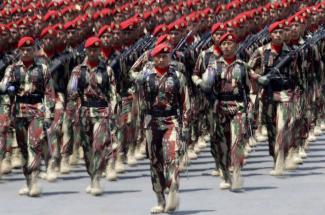Our view
By force or by consensus

In principle, a nation’s military is supposed to protect it from foreign enemies. Since World War II, humankind has seen far more military coups than cross-border wars. Africa, Asia and Latin America were affected in particular.
Military dictatorships tend to be oppressive, traumatising citizens long term. Typically, however, they fail to fulfil their promises of progress and prosperity. Eventually, people dare to speak up against repression, and in the long run, political power cannot be enforced only by gun barrels.
Sometimes, armed forces are catalysts of change. During the two periods of military rule in Ghana under Jerry Rawlings, the fight against corruption was paramount, and Rawlings later handed power over to a civilian government voluntarily. In Venezuela, a military coup under Hugo Chávez initiated social reforms to benefit the poorest. However, his party’s government failed to diversify the oil-dependent economy, and his successor is now acting in an increasingly despotic manner (see essay). Libya’s first decades under Muammar Gaddafi’s rule were marked by big infrastructure projects and investments in health and education. However, he is a good example of military rulers clinging to power for a long time and becoming just as cruel and corrupt as the presidents or kings they have ousted.
Sometimes the armed forces step in to get rid of a dictator and are hailed as saviours. A recent example is Zimbabwe, where the military toppled long-time autocrat Robert Mugabe. The problem is that the armed forces had helped him to stay in power for decades. It remains to be seen whether free and fair elections will now be held as promised.
In recent decades, international peacekeeping efforts have made a difference in many places, including South Sudan, Mali or the DR Congo. Troops from many different countries have been deployed as blue helmets by the UN. To some extent, such interventions shape the attitudes of the participating troops as they develop a deeper understanding of multilateral affairs and the relevance of good governance. In far too many countries, however, soldiers are still prone to acting like marauders who attack the very people they are supposed to protect.
Germany has had bad experiences with militarism and dictatorship. When West Germany set up a new army a decade after the end of the Hitler dictatorship, a new term was coined: soldiers were defined to be “citizens in uniform”. This approach was new. It implied that soldiers not only had individual rights but also a duty to uphold the rule of law. German soldiers are not supposed to merely receive commands. If need be, they are expected to disobey orders that breach human rights and constitutional principles.
The German notion of “citizens in uniform” means that troops must not only be trained in the use of weapons. Their responsibilities as citizens matter at least as much. The concept changes the self-perception of armed forces. They do not see themselves as agents of war, but as protectors of peace. Once that is the case, citizens can embrace soldiers as equals and need not fear their guns.
Sheila Mysorekar is member of the editorial team of D+C Development and Cooperation / E+Z Entwicklung und Zusammenarbeit.
euz.editor@fazit-communication.de











